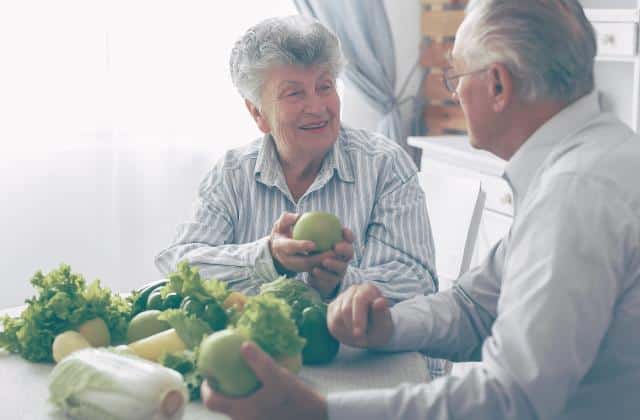Wholesome and Effortless: Easy Meal Ideas for the Elderly
As we age, our dietary needs evolve, but the desire for flavorful and satisfying food remains constant. Elderly individuals often need nutrient-dense meals that are easy to prepare, easy to chew, and easy to digest. Catering to these needs doesn’t have to be a daunting task. Here are some tips for caregivers on what healthy meals to cook. In this guide, we’ll explore a variety of easy meals for the elderly that are both healthful and delicious, ensuring meal times are enjoyable and nourishing.
The Art of Simple and Nutritious Cooking
Creating meals for older persons does not require intricate recipes or prolonged kitchen time. The focus should be on minimally processed foods that are high in vitamins, minerals, and fiber, and easy on the palate and stomach. Here’s how to strike the perfect balance with meal prep for older adults:
Breakfast: A Gentle Start to the Day
Start the morning with a warm bowl of oatmeal. It’s a simple yet powerful meal for the elderly, providing soluble fiber that is beneficial for heart and digestive health. Top it with fresh berries, a sprinkle of cinnamon, and a dollop of Greek yogurt for a protein boost.
Lunch: Light and Satisfying
A hearty soup or stew can be a perfect lunchtime meal, especially for those who prefer softer foods. Lentil soup packed with vegetables offers ample protein and nutrients. Prepare in large batches and freeze in portions for a quick and healthy meal that’s easy to reheat.
Dinner: Nutrient-Rich Comfort Food
For a fuss-free dinner, baked salmon with a side of steamed broccoli and sweet potatoes provides a meal rich in omega-3 fatty acids, vitamins, and antioxidants. Such a meal is not only a delight to the senses but also a boon for maintaining muscle mass and cognitive function in the elderly.

Snacks: Wholesome Nibbles
Snacks are an important part of the elderly meal plan to maintain energy levels throughout the day. A small handful of nuts or sliced fruits can be refreshing and packed with nutrients. A smoothie can also serve as a snack or a meal replacement, blending leafy greens, a banana for sweetness, and protein powder for an extra healthful punch.
Food Prep for Seniors: Making it Manageable
Meal prep for older adults should prioritize convenience and accessibility. Pre-chopping vegetables, portioning out servings, and utilizing kitchen appliances like slow cookers can simplify the process. Slow-cooked meals can be particularly beneficial as they often result in tender, easy-to-chew outcomes that are ideal for seniors.
Healthy Senior Meals: A Balanced Plate
Healthy meals for the elderly should include a good balance of lean protein, complex carbohydrates, healthy fats, and plenty of fruits and vegetables. Fish, chicken, and lean meats; brown rice, quinoa, and whole-grain bread; avocados, olive oil, and nuts; and a variety of colorful produce will make for a rounded and appetizing diet.
Nutritious Meals for the Elderly: The Importance of Hydration
While focusing on solid foods, one must not forget the importance of hydration. Soups and broths, along with regular water intake, can help maintain proper hydration levels, which is often a concern in older adults.
Elderly Meal Plan: Structure and Variety
Creating a weekly meal plan can aid in ensuring a variety of nutrients are consumed and can help to avoid mealtime monotony. Incorporating themes such as “Meatless Mondays” or “Fish Fridays” can add an element of fun and anticipation to eating.
In closing, meals for the elderly should be thought of as a fusion of sustenance and simplicity. The aim is to create easy meals for the elderly that offer nutritional benefits without overwhelming them with complicated recipes or extensive cooking times. By following these principles, we can ensure that our elderly loved ones are well-fed, happy, and healthy.
Team of Angel Care,Inc.,New York home care agency has wide range of services, if you need help or want to know more please contact us: by phone at 917-507-7500 or by e-mail at [email protected].

In the dynamic sphere of health and safety, medic alert devices stand as a bulwark of security. They are especially valuable for seniors who seek independence along with a safety net, and for caregivers concerned about the elderly. These gadgets not only bring peace of mind to users but also to their families, who might be anxious about the wellbeing of their loved ones. In this article, we explore the top-tier medical alert systems that blend innovation, reliability, and user-friendliness, focusing on life alert systems, their customer service, and the crucial features such as fall detection that these devices offer. Understanding the Essence of a Medic Alert Device At its core, a medic alert device is a wearable piece of technology that can send an emergency signal at the push of a button. It's a personal safety companion that ensures help is on the way when it's most needed. The best medical alerts systems come equipped with features tailored to the unique needs of seniors, providing not just emergency services but also a link to family members or caregivers in times of need. Alert System for Seniors: What to Look for When considering an alert system for seniors, one must assess the device's ease of use, the range of the alert system, the battery life, and the speed of the response team upon activation. For seniors, the ideal device should be non-intrusive, simple to operate, and should offer adequate coverage whether they are at home or on the go. Life Alert Systems: The Vanguard of Emergency Response Life alert systems are synonymous with emergency response for seniors. Renowned for their "Help, I've fallen and I can't get up" advertising campaign, these systems have become a household name. The best systems offer a direct line to a dedicated monitoring center, ensuring that life alert customer service is quick to assess the situation and dispatch the appropriate assistance, be it medical services or notifying a family member. Fall Alert Systems: An Essential Feature One of the most common accidents seniors face is falling. Therefore, the best medical alerts for seniors come with sophisticated fall alert systems. These devices are engineered to detect falls automatically and send an alert without the need for the senior to press a button, which is crucial if the user is incapacitated or unable to reach the device. Medical Alerts for Seniors: Connectivity and Support It's vital for medic alert for seniors to offer a robust support system. This means reliable connectivity to a monitoring center and access to immediate customer service should there be any issues or questions regarding the device. The top-rated systems ensure that users can reach life alert customer service 24/7, with minimal wait times. LifeAlert System: An Integrated Approach to Safety LifeAlert, one of the pioneers in the industry, offers a comprehensive system that encompasses not just fall detection but also protection in the event of a fire, CO poisoning, and even home intrusions. Their systems often come with waterproof pendants and wristbands, ensuring that they remain functional in a variety of scenarios, including showers, where falls are common. The Best Medical Alert Systems: A Mixture of Technology and Compassion The best medic alert device is one that combines the latest technology with an understanding of the human element. It's about more than just the tech; it's about providing a service that respects the dignity and independence of seniors, backed by a compassionate and efficient customer service team. Such a system would be feature-rich, offering GPS tracking for location-based alerts, reminders for medication, and even daily check-in services. The best medical alerts systems are those that provide a seamless, user-friendly experience while ensuring immediate assistance is always at hand. As technology evolves, these systems are becoming more advanced, but the goal remains the same: to allow seniors to lead independent lives with the reassurance that help is just a button-press away. If you or your loved one needs care, contact our Angel Care,Inc.,New York home care agency for help, ask your questions by phone at 917-507-7500 or by e-mail at [email protected].

Maintaining personal cleanliness is a basic need, often effortlessly fulfilled by many. Yet for some seniors, this daily ritual poses significant challenges. For caregivers, mastering the delicate task of assisting elderly individuals with their bathing routine is essential, ensuring it is conducted with gentleness and respect. This guide outlines thoughtful strategies and advice to facilitate a secure and soothing bathing experience for the elderly, utilizing supports ranging from dedicated shower chairs to gentle sponge bathing methods. Ensuring a Risk-Free Bathing Space The utmost priority when bathing an elderly individual is to ensure their safety. The bathroom should be adequately illuminated and heated to avert any discomfort due to cold. Anti-slip mats should be placed strategically to prevent slipping incidents, and installation of sturdy grab bars is critical for added support. Consider the use of step attachments for conventional tubs or the incorporation of a walk-in bathtub for easier access. Support for Showers and Bathing In the realm of elderly showers, a specialized chair can be a game-changer, offering the senior a stable place to sit during the bath, thus mitigating fall hazards. A detachable showerhead allows for a more precise and convenient rinsing process. If a standing shower is impractical, sponge baths are an equally efficient alternative. These can be conducted while the individual is comfortably seated or even while lying down, should their mobility be significantly restricted. Selecting Suitable Bathing Aids Opt for bathing aids specifically designed with the elderly in mind. An elder-friendly bathtub, for instance, might feature integrated seating and non-slip surfaces. Adjustable devices to regulate water temperature can ensure safety from scalding, and for those needing additional assistance, mechanical lifts and other aids can facilitate safer transitions into and out of the bath. Executing the Bathing Routine Prior to commencing the bath, ensure the elderly person’s privacy and maintain a warm environment to prevent any discomfort. Confirm the water's warmth before beginning. Start with the Face and Upper Body: Gently cleanse the face with a tender washcloth, then proceed to the arms and upper body. If giving a sponge bath, ensure the cloth is sufficiently wrung to prevent water from dripping. Attend to the Lower Body: Wash the legs and feet, being attentive to clean between toes and within skin folds carefully. Back and Gluteal Areas: Given their susceptibility to pressure sores, extra care is necessary in these regions. Assistance may be required for the senior to shift positions for thorough cleaning. Intimate Care: Tending to private areas should be done last for sanitary reasons, employing gloves and a tactful, considerate manner. Foster Communication and Comfort Keep the lines of communication open throughout the bath, narrating each action to involve the senior and maintain their dignity. Exercise patience, allowing them the autonomy to wash themselves as much as they are able, stepping in to assist when necessary. Post-Bath Care On completion of the bath, assist the senior in exiting the tub or shower with care, ensuring they are dried immediately to avert any chill. Apply moisturizer to prevent skin dryness, a common issue in aged skin that is often more fragile. Sponge Bathing: A Considerate Option Sponge baths provide a viable alternative for those who cannot use a shower or bathtub, offering a thorough cleanse with minimal movement, either seated or in a reclined position. Professional Bathing Support from Angel Care At times, the wisest choice is to engage professional bathing services for seniors. Angel Care,Inc., New York home care agency offers experienced caregivers adept at handling the nuanced needs of seniors with varying health conditions. For support, contact us at 917-507-7500 or via email at [email protected].



